.jpg)
Top 5 No Code AI Agent Builders (2025)- Comparison + Guide

Looking for the best no code AI agent builder to create smart assistants without writing a single line of code?
In 2025, AI agents are no longer just for tech teams. Whether you’re running a startup, scaling a sales team, or automating admin work, today’s AI agent builder platforms let you design, train, and launch powerful AI assistants in hours-not months.
Now that you are ready to build your own AI agent in minutes, start reading to discover how easily and quickly you can bring AI into your business, on your terms.
What Is an AI Agent? (Beginner-Friendly Definition)
Think of an AI agent as your smart assistant that gets things done without you lifting a finger. But instead of being a person, it’s powered by artificial intelligence.
So, what’s an AI agent?
It’s a computer program that understands tasks, takes actions on its own, and learns from what happens next. It makes decisions based on what’s happening around it. Like a well-trained employee, it keeps improving the more it works.
In technical terms, what are agents in Artificial Intelligence?
An AI agent observes what's going on (like reading an email or listening to a customer message), processes the information, chooses the best action, and acts. Then it watches what happened as a result, and uses that to do better next time.
Still wondering what is an agent in Artificial Intelligence?
Let’s simplify it: Imagine a chatbot that doesn't just respond, but also learns from how people reply. Or a virtual assistant that books meetings, sends reminders, sorts leads, and even replies to follow-ups. That’s an AI agent in action.
What makes them even more powerful today is that you don’t need engineers to build them anymore. With a no code AI agent builder, you can make your own AI agent.
Want to see how fast you can build one?
Keep reading. You’ll be surprised how quickly your business can start using AI that works.
Top Use Cases for AI Agents in 2025.
Wondering what can AI agents do? They're not just “smart bots”—they’re active workers behind the scenes in many businesses. From replying to messages to analyzing your sales pipeline, they’ve quietly taken over tasks people once spent hours doing.
Here’s how they’re showing up:
1. Customer Support (without Burnout)
Tired of long email chains and missed DMs? AI agents handle those instantly.
They respond to customer questions, track complaints, and even process refunds. Brands in eCommerce and SaaS use AI agents to answer 70–90% of questions without ever needing a human to step in.
2. Sales Follow-ups (Never Drop a Lead Again)
Let’s say a lead fills out a form. Instead of waiting hours for your sales team, an AI agent replies in seconds, asks qualifying questions, and books the meeting. In real estate and insurance, agents are used to send reminders, follow-ups, and even personalized messages based on lead behavior.
3. Business Analytics
AI agents dig into your data, summarize it, and answer questions like “Why did our revenue dip last week?” Retail chains and agencies are using AI in the workplace to pull daily reports, forecast trends, and give real answers.
4. Personal Assistant Tasks
Need to schedule meetings, draft emails, or sort files? AI agents can handle all of that. Busy founders and teams use agents that manage calendars, prepare daily to-do lists, and even filter email inboxes.
5. Healthcare, Law, Finance? Yes, Even There
- Clinics use AI agents to book appointments and remind patients.
- Law firms use them to summarize case files or respond to basic legal queries.
- Finance teams use them to generate expense reports, detect irregularities, or assist clients with FAQs.
And the best part? You don’t need to hire developers to build them. Using a no code AI agent builder, even small businesses can now set up agents that work like an extra employee.
Benefits of Using a No Code AI Agent Builder
Hiring developers, training teams, writing endless lines of code—this used to be the only way to develop AI agents. Now? You can skip all of that. A no code AI agent builder changes the game completely, bringing AI to your team without the tech overwhelm.
Here’s why businesses are ditching traditional development:
1. Launch in Hours, Not Months
Building AI used to take months. With no-code builders, it takes a few clicks. You just describe the task, train it with your data or workflows, and hit publish. Startups and SMBs use it to roll out AI agents in a single afternoon.
2. Built for Non-Tech Founders and Teams
You don’t need to know Python or prompt engineering. These builders are visual, intuitive, and guided. Anyone from HR to operations can now develop AI agents that handle everyday work.
3. Save on Development Costs
Custom AI solutions can cost ₹5–10 lakh or more. No-code AI agent builders slash that to a tiny fraction. For the price of one dev’s monthly salary, you get an AI team that scales up without burning cash. Agencies, consultants, and solo founders are using these tools to stay lean and competitive.
4. Test Fast, Grow Faster
Want to try a support agent, a lead gen bot, and a marketing analyst? You can. No-code tools let you test, tweak, and relaunch without needing to rebuild from scratch. It’s a playground for experimentation that big companies are already leveraging.
The message is simple: You don’t need to be a coder to build powerful AI. With a no code AI agent builder, anyone can plug intelligence into their business.
How to Create Your Own AI Agent (Step-by-Step)
You don’t need to be a developer or tech geek to build your first AI agent. If you can fill out a form or drag and drop blocks, you can do this. Using a no code AI agent builder online, anyone can train a smart assistant to handle repetitive tasks, answer questions, or even run entire workflows.
Here’s how to create your own AI agent without touching a single line of code:
1. Choose a No Code AI Agent Builder
First, pick a tool that’s beginner-friendly. Look for platforms like AgentGPT, Cognosys, or the no-code section of OpenAI’s GPT Builder. These platforms usually come with pre-made templates, so you don’t have to start from zero.
Tip: Start with the free version. Most tools give you access to all the core features without asking for payment upfront.
2. Define What Your Agent Will Do
Be specific. What do you want your AI agent to handle?
Examples:
- Reply to customer queries
- Recommend products
- Summarize long emails
- Send follow-up messages
- Generate reports based on data
The more clearly you describe the task, the better your agent will perform.
3. Train It with Simple Instructions
Now comes the fun part, training your AI. You’ll see a chat window or a prompt box where you can type instructions like:
“When someone asks about shipping time, respond with delivery estimates based on the city.”
“Reply to user reviews politely and thank them.”
Some tools even let you upload documents, chat logs, or spreadsheets as training material.
4. Choose Inputs and Outputs
Decide what your agent will take in and what it should give back.
For example:
- Input: Text message from a user
- Output: Answer with a product link + delivery date
Drag-and-drop tools help you connect these in minutes.
5. Test It Live
Run a few test messages and see how your AI replies. If something feels off, just tweak the instructions or training content. You don’t need to restart everything, it updates instantly.
6. Publish and Share
Once you’re happy with how it works, deploy your AI agent. Most tools give you a link, a widget, or even a WhatsApp number to share with others.
That’s it. You just created your own AI agent, without writing a single line of code.
Using a no code AI agent builder online, anyone can build an assistant that works 24/7. You can build one for yourself, your team, or even sell these to others.
Ready to build yours? It takes less than an hour. Let’s move on and see which platform suits you best.
Top 5 No Code AI Agent Builder Platforms in 2025
If you're running a business and tired of waiting months for developers or paying ridiculous amounts for basic automation, you're not alone. This year, no-code AI agent builders are rewriting how fast businesses move.
You don’t need to code, and you don’t need a tech background. You just need the right tool. Here's your hit list of the best no code AI agent builder free platforms in 2025.
1. Ampcome
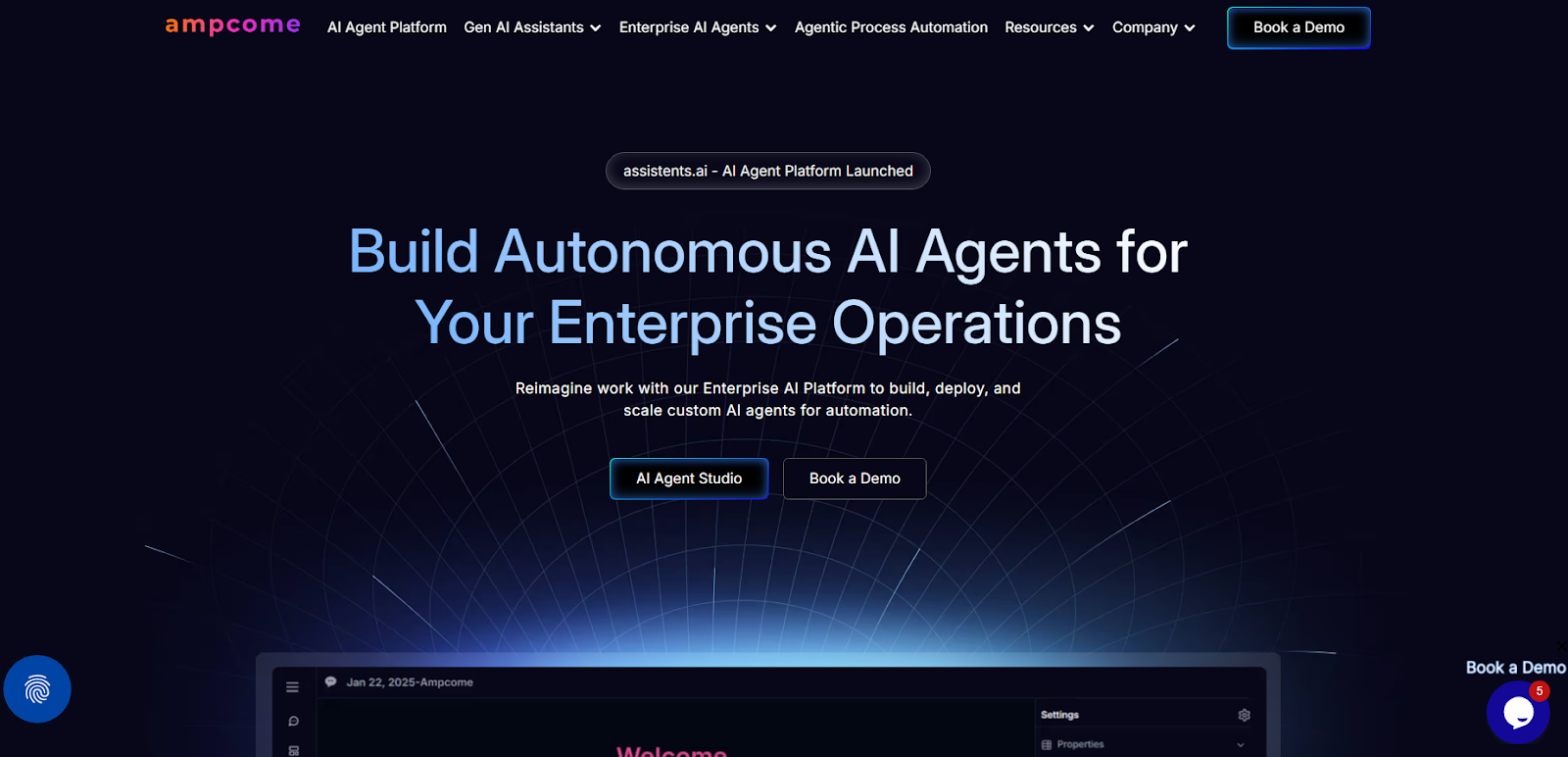
Who it’s for: Large enterprises handling mission-critical workflows—finance, healthcare, manufacturing, or logistics.
What it does: Builds autonomous AI agents that operate in a global 24x7 cycle. While one team sleeps, another develops, tests, or deploys. Their system continuously ingests operational data and triggers agents to take timely actions.
Why it's appealing: Adaptive AI agents that improve with usage. Their architecture reduced fraud response by 40%, increased manufacturing uptime by 60%, and unified 12+ hospital data systems. Agents learn from context and past behavior, making automation more intuitive over time. Pricing is custom and typically starts at enterprise-level discussions.
2. Lindy (lindy.ai)
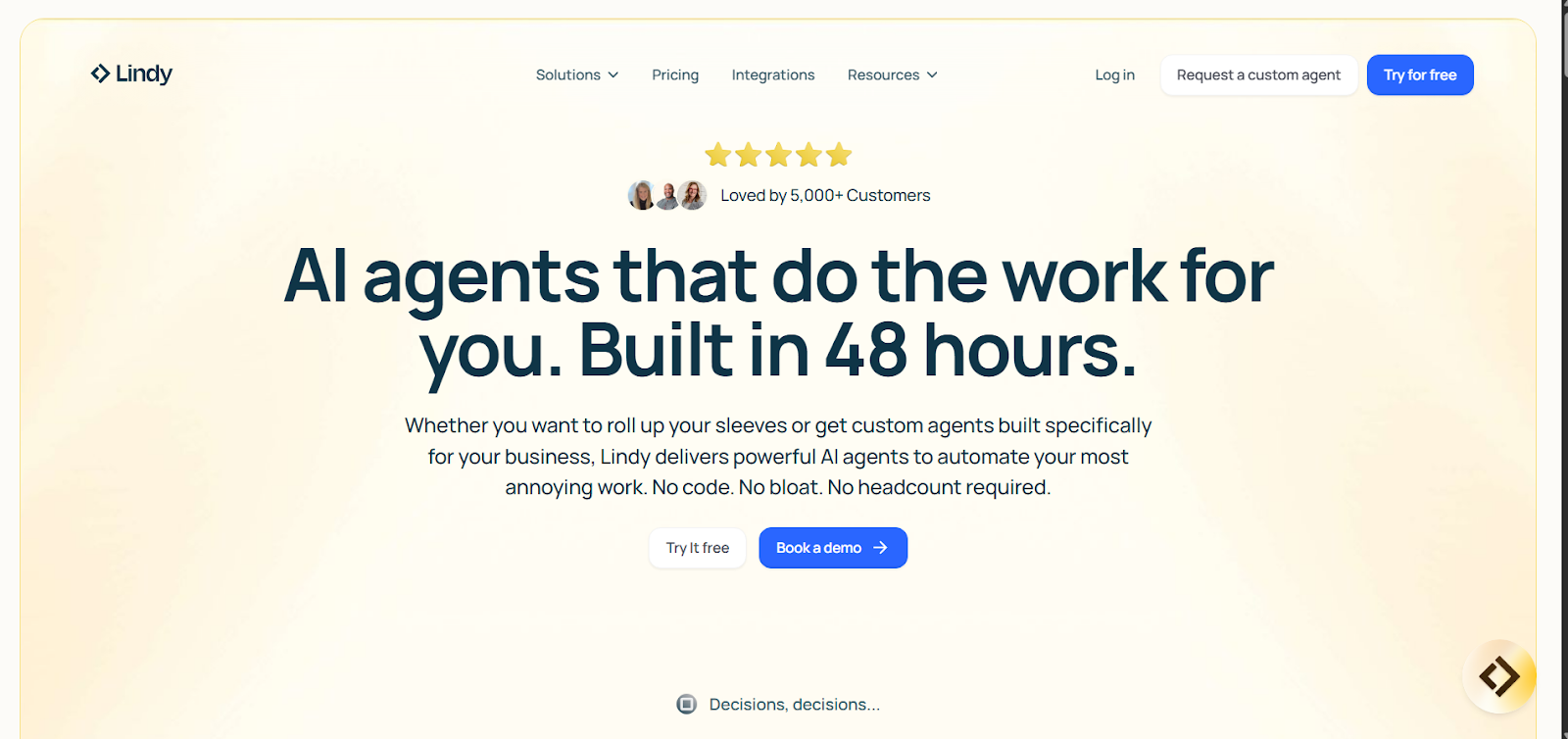
Who it’s for: Small to mid-size teams in sales, HR, marketing, or operations.
What it does: Build AI workflows visually—no coding required. Includes ready-made agents for tasks like inbox sorting, CRM updates, and lead follow-ups. Agents understand context and can share tasks in a team (Lindy calls it a “society” of agents).
Why it's appealing: You get a visual builder, templates, plus integrations with 3,000+ apps (Gmail, Slack, Salesforce). Lindy is SOC 2 and HIPAA compliant and offers a freemium starter plan and paid tiers from $49/month.
2. SmythOS (smythos.com)
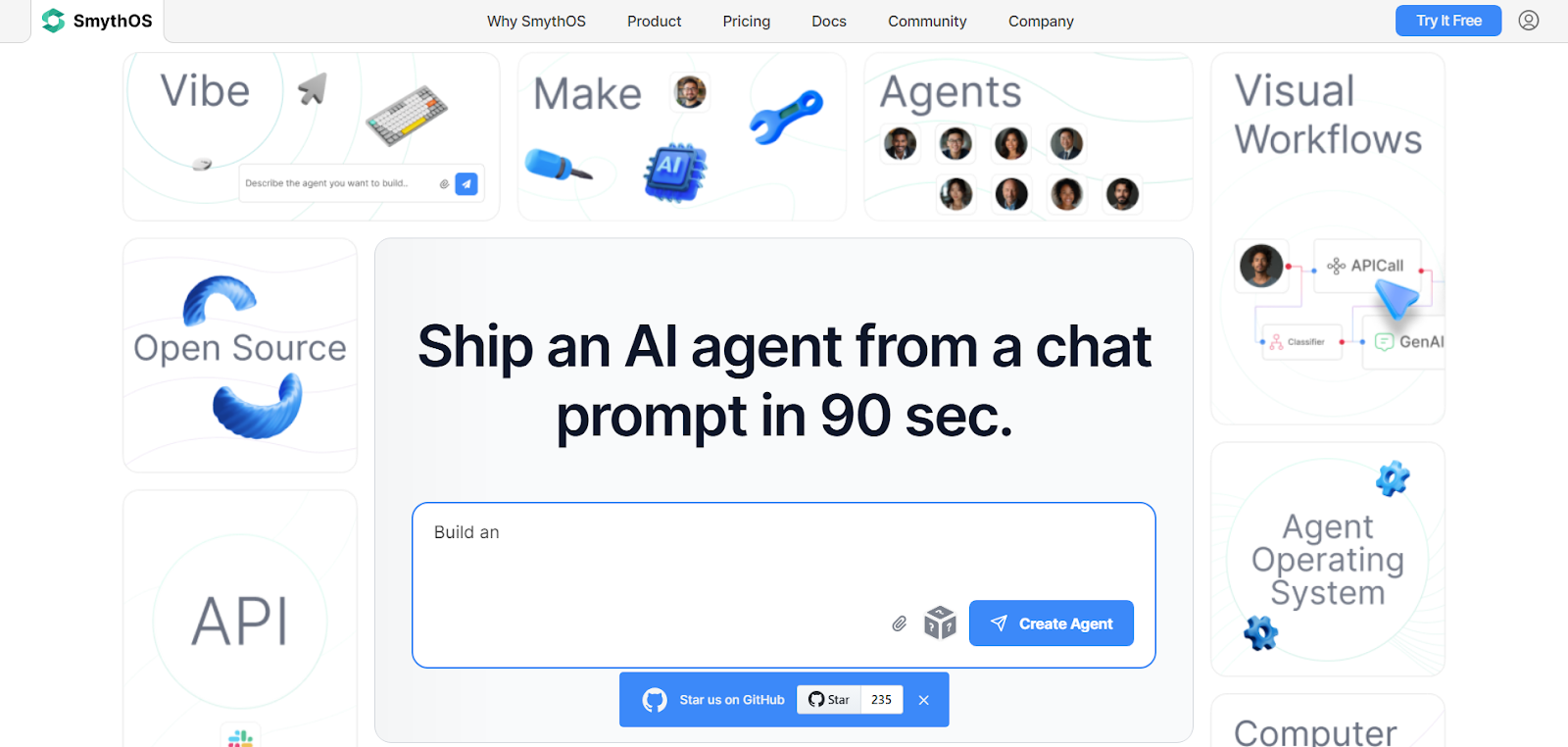
Who it’s for: Tech-savvy teams and developers in enterprises, IT consulting, or devops.
What it does: Offers a full agent OS to build, debug, and deploy AI agents. You can step through how each agent thinks, orchestrate them, and host them securely—on cloud or your own servers.
Why it's appealing: Open-source core, built-in debugging tools, secure sandboxing, and support for scheduling complex workflows. Integrates with 300,000+ APIs and platforms like Slack, Discord, or custom apps. There's a free tier and paid plans with advanced features.
3. Gooey.AI (gooey.ai)
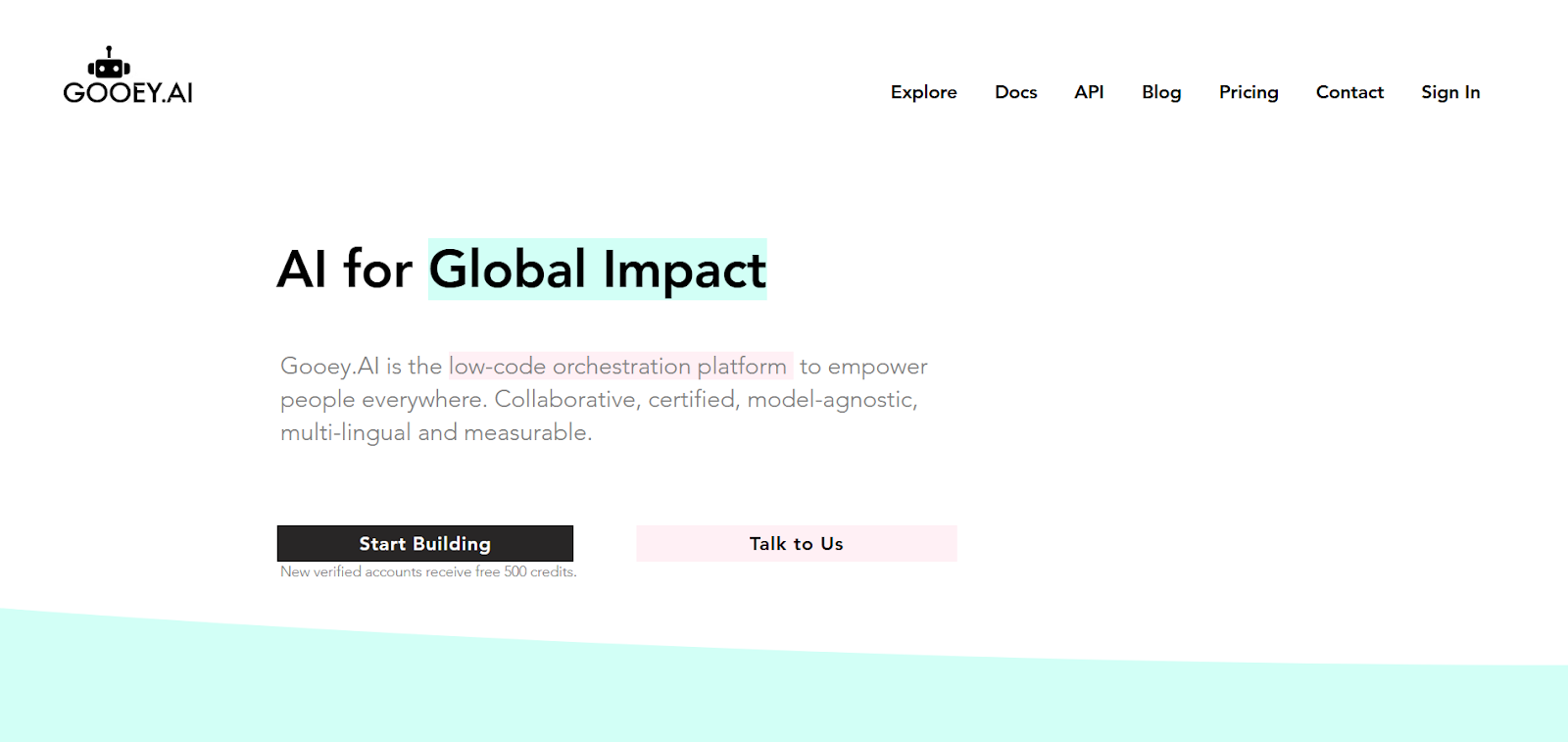
Who it’s for: Teams experimenting with AI prototypes or building multilingual chatbots—nonprofits, marketers, operations, or developers.
What it does: Chain language models, tools, and vector-search knowledge bases using a simple builder. Deploy agents to WhatsApp, web, mobile, voice or SMS. Models can switch mid-flow depending on context.
Why it's appealing: Mix of public and private models, built-in support for languages and speech translation. Works for NGOs, customer support, or research bots. Usage-based pricing after free credits, great for testing or scaling.
4. Empler AI (empler.ai)
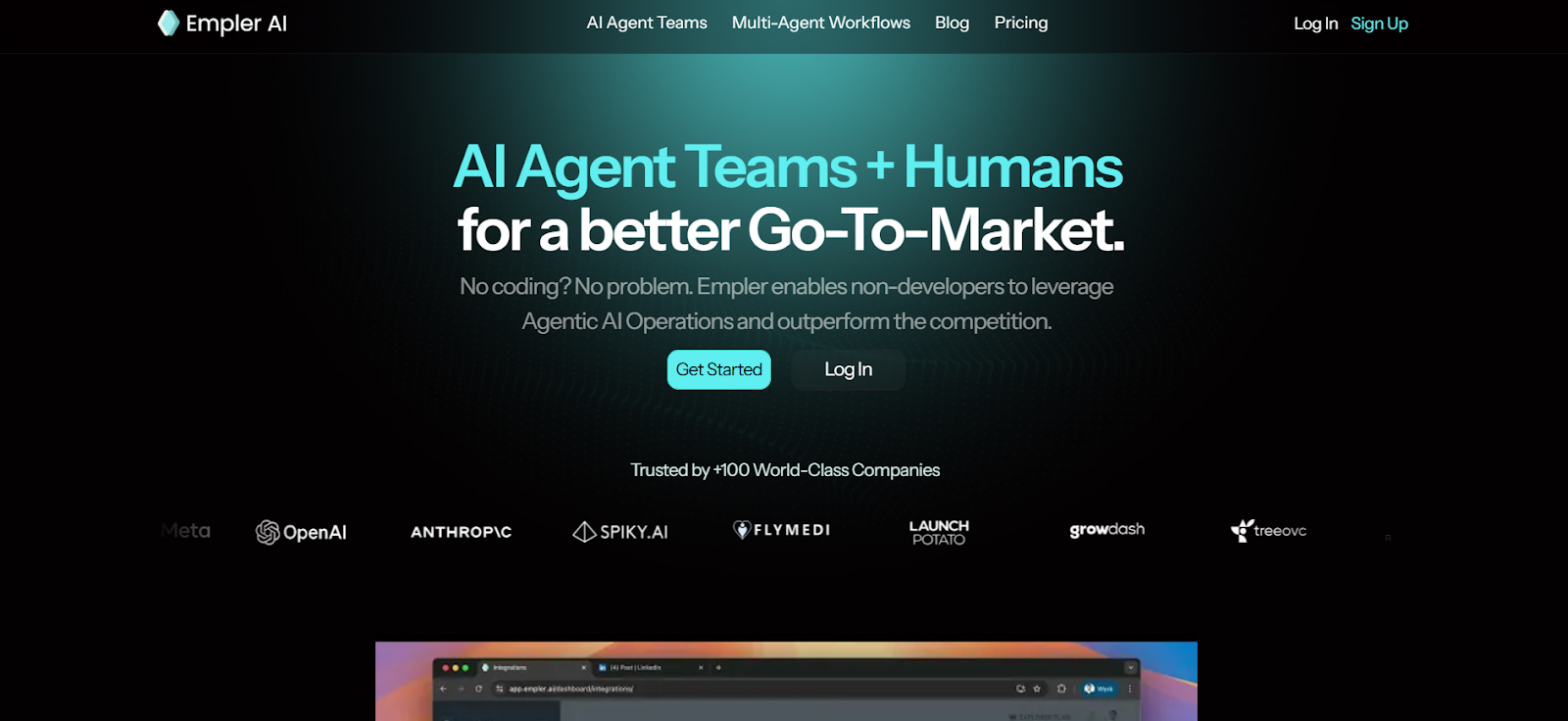
Who it’s for: Revenue teams—marketing, sales operations, or growth squads.
What it does: Build AI “teams” where each agent has a specific role: generating leads, enriching data, filtering prospects. Agents plug into CRMs like Salesforce, without needing direct API access.
Why it's appealing: Pre-built workflow templates for B2B tasks, including lead research, content briefs, or competitor monitoring. Works with spreadsheets or internal data, without hiring developers. Pricing often starts with pilot programs or case-study deals.
5. AgentHub (agenthub.us)
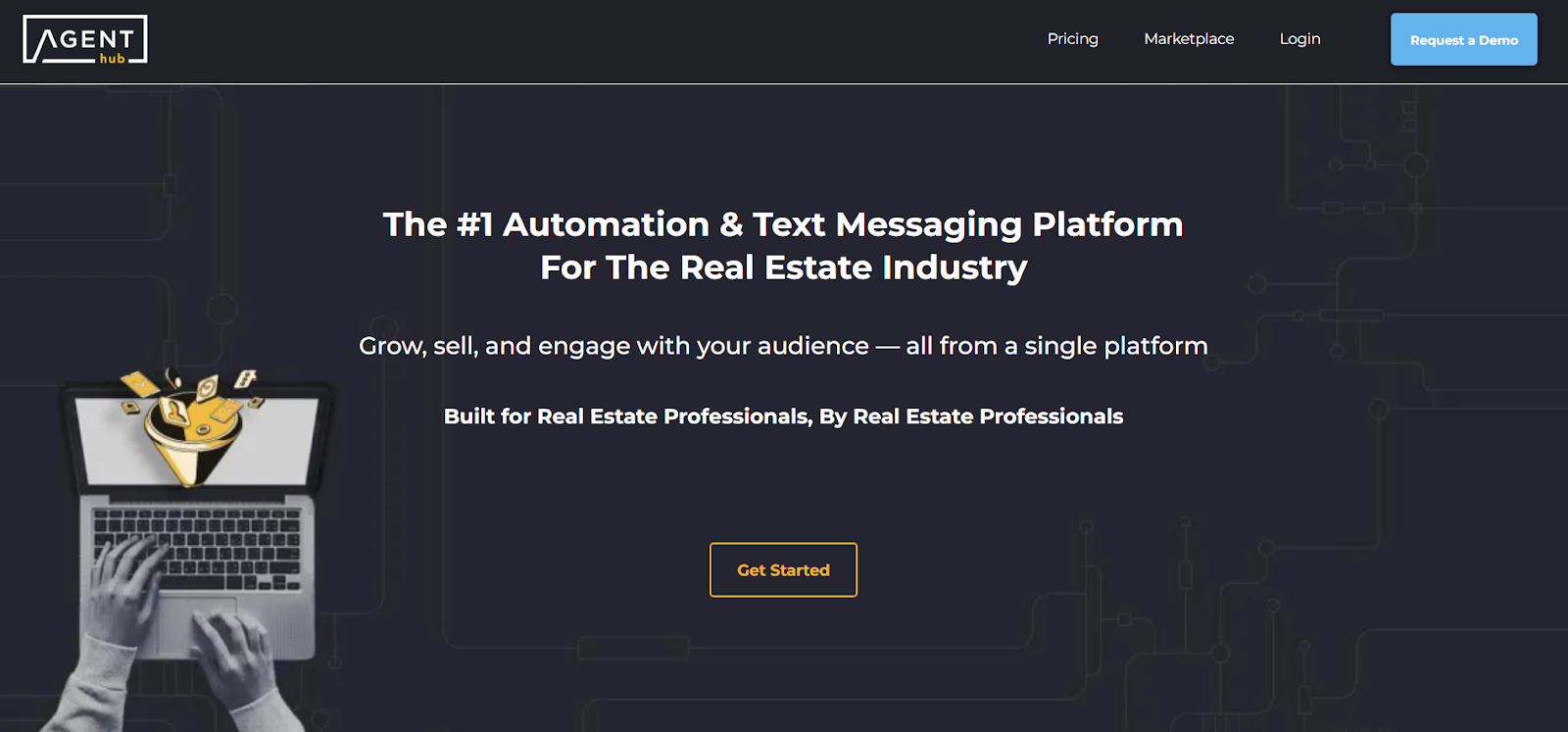
Who it’s for: Teams needing fast automation setup—especially in areas like sales follow-ups or HR screening.
What it does: Choose a template, tweak prompts or data sources, and deploy within minutes. Handles emailing, lead qualification, resume filtering, or admin tasks.
Why it's appealing: Easy to set up and launch. Ideal for quick wins. Starts around $295/month and is ideal for teams ready to invest in automation with minimal setup.
AI Agent Platform Comparison (2025): Features, Pricing, and What to Expect Next
AI agents are no longer futuristic tools. They are actively reshaping how businesses handle customer support, automate tasks, and manage data. But with dozens of platforms in the market, picking the right one can feel overwhelming.
This AI agent platform comparison breaks down key players so you can make a confident decision.
AI Agent Platform Comparison Table
Prices updated as of August 2025. Check each platform for the latest plans and features.
How to Build Reliable AI Agents: Practical Tips
If you’re new to building agents, these practical steps will keep your setup sharp and helpful.
1. Start with a single task
Don’t try to build an all-purpose agent on day one. Pick one outcome like summarizing files, replying to refund requests, or checking website performance.
2. Keep prompts short and clear
Give simple instructions like: “Read PDF and highlight key risks.” Avoid abstract phrases or open-ended goals.
3. Feed real context
AI agents work best when they’re given materials to work with—FAQs, manuals, past conversations, or company policies.
4. Test in parts
Run your agent in small blocks. Instead of a 12-step flow, test two steps first. This avoids confusion and saves time.
5. Keep track of errors
Don’t just deploy and forget. Look at how the agent performs. Use logs to fix repeated mistakes and improve responses.
Common Pitfalls to Avoid When Building Agents
Skipping planning or rushing the build leads to disappointing results. Avoid these common mistakes:
- Giving too many tasks at once
Confusing agents with multiple goals in one run often leads to weak or wrong outputs. - Ignoring real user language
Agents trained only on documentation may miss the tone or intent of everyday users. Include user phrases, slang, or specific product terms. - Overcomplicating logic
Just because agents can do more doesn’t mean they should. Simpler workflows run better and are easier to fix. - Missing documentation updates
If your knowledge base changes, your agent should know. Don’t let it run on old data.
What’s Ahead: The Rise of No-Code AI Agent Builders
The next evolution is already happening. You no longer need to code to create powerful agents.
Here’s where things are heading:
- Drag-and-drop builders are becoming more common. Tools like Zapier AI or OpenAI’s GPT Builder let users create workflows visually, with no programming.
- Multi-agent systems are entering mainstream use. One agent fetches data, another summarizes it, and a third emails results.
- Voice-first agents will soon run meetings, schedule calls, and draft notes just by listening.
- Context-smart agents are gaining ground. These understand spreadsheet formulas, customer history, and writing style.
Getting in now means you can learn early, automate faster, and gain an edge before tools become too saturated or expensive.
Final Thoughts: Make Your Move Today
This AI agent platform comparison gives you the clarity to choose what fits your current work, goals, and tech comfort. Don’t wait for the perfect tool to arrive. The best platform is the one you start using today.
Set up one agent. Watch how it works. Improve it over time.
That’s how every smart system begins.
Ready to see what AI agents can really do at scale?
Ampcome builds smart, enterprise-ready agents that work just like your business. If you're tackling fraud, fixing downtime, or just tired of slow, clunky workflows, we’ll help you build agents that actually deliver.
Talk to us about your AI use case today.
Start small. Build wisely. Let the agent handle the repetitive work, so you can focus on better things.
FAQs
1. What is the easiest AI agent platform for beginners?
OpenAI GPTs and Poe by Quora are both intuitive, quick to use, and don’t require technical knowledge.
2. Can these AI agents connect with other tools like Google Sheets or Notion?
Yes. Tools like AgentGPT and LangChain offer integrations through Zapier or APIs to connect with Notion, Google Workspace, and databases.
3. Is it expensive to run AI agents every day?
Not necessarily. Most platforms have free versions or entry-level plans. For example, Hugging Face has a robust free tier for personal projects.
4. Can I use agents for customer service or e-commerce?
Yes. You can train AI agents using past support conversations, refund policies, and product details to answer questions accurately and reduce support volume.
5. Where can I learn how to build AI agents from scratch?
Useful guides are available on:
- OpenAI Cookbook
- LangChain Documentation
- Hugging Face Learning Center

Transform Your Business With Agentic Automation
Agentic automation is the rising star posied to overtake RPA and bring about a new wave of intelligent automation. Explore the core concepts of agentic automation, how it works, real-life examples and strategies for a successful implementation in this ebook.
More insights
Discover the latest trends, best practices, and expert opinions that can reshape your perspective
Contact us












